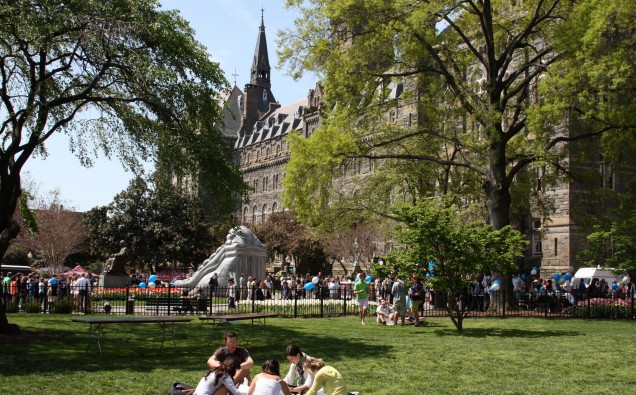
Georgetown University, Photo by Lucas Cantor, Wikimedia Commons
For the United States, the impact of international students and exchanges has only amplified in recent years. Besides infusing new intellectual capital into the U.S. academic environment each year, foreign students – now numbering more than one million – contribute significantly to the American just last year created more 400,000 jobs .
Silicon Valley in California is a symbol of how American and international information technology experts are shaping the digital world and America’s new pillars of economy and influence.
According to the Association of International Educators, international students stimulated $ 32.8 in overall economic activity during 2015-16 school year.
And that is just one dimension of the tremendous benefits the international students bring to the United State each year.
The importance of foreign students’ cultural, political and economic contribution has gained a fresh focus in the light of a recent travel ban on citizens from the Middle Eastern and African countries.
Recently, some racially charged incidents including fatal shooting of an Indian IT expert in Kansas, have raised concern in academic circles, Silicon Valley and universities about their implications. American scholars and education experts are making a strong case for keeping the United States a top destination for international students.
“For decades, the United States has recognized that by having international students here, we benefit from the exchange of ideas from bringing together smart people which fosters innovation, which helps the United States economy,” Esther Brimmer, the executive director of the NAFSA, the Association of International Educators, says.
At the same time, Brimmer told National Public Radio that international students in the long run serve as America’s informal ambassadors.
“People around the world who have studied in the United States usually go home with a positive view of the United States — they learn more about the United States. And as they go on to their careers — and many of them have careers as diplomats and business leaders — they retain that positive view of the United States.”
Michael M. Crow is the president of Arizona State University, illustrated in an opinion piece in The Christian Science Monitor how American states across the country benefit from international students. Citing NAFSA figures, he highlights that “the impact can be felt in every state in the country.”The economic activity produces $5.2 billion in California and $3.9 billion in New York. The top 10 states – which includes Pennsylvania, Ohio and Michigan – experienced a $21 billion benefit, accounting for some 265,000 jobs, he says.
“In my own state of Arizona, ranked 13th in the country, the economic contribution is $620 million and 8,500 jobs.”
But the tremendous impact of international students pursuing higher education and research in the United States works both ways.
“These are the kinds of experiences that enrich us all, without which we as a nation will be poorer, both culturally and economically. And likely less safe: We all benefit from Pakistani scholars, for example, who are seeking ideas to solve the rolling power blackouts in their country – efforts that will help Pakistan advance economically, providing greater employment and education to their young men and women and, in the process, become more stable and secure,” Crow writes.





![By Michael from San Jose, California, USA (Palm Row) [CC BY 2.0 (http://creativecommons.org/licenses/by/2.0)], via Wikimedia Commons](https://www.viewsnews.net/wp-content/uploads/2017/02/SAN_JOSE_CALIFORNIA_PALM_TREE_2010-1024x683.jpg)













